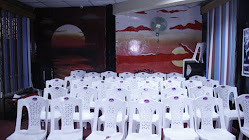Africans tuning into more local TV programmes

Tuesday, October 11, 2016
A TV screen showing one of Kenya's popular stations. Africans are
enjoying a surge in local TV content they can finally identify
with/PHOTO/SULEIMAN MBATIAH | NATION MEDIA GROUP
Raised on the
backstabbing intrigue of 1980s American soaps "Dallas" and
"Dynasty", and later, the heady drama of South American telenovelas,
Africans are enjoying a surge in local TV content they can finally identify
with.
It took a while, but in the past decade local programming has
soared in sub-Saharan Africa's key economies, a rise driven by both foreign
satellite networks and television stations on the continent.
This growth has delivered up local shows such as Kenya's comedic
"Real Househelps of Kawangware" — a play on the US "Real
Housewives" series — along with talk shows, political satire and
continent-wide reality TV such as "Big Brother Africa" and
"Project Fame".
And demand is set to grow with the number of households owning a
television expected to double to more than 150 million in the next 10 years,
according to TV market research firm Dataxis.
To Olivier Laouchez, head of French music network Trace, offering
local content is simply "common sense".
"When you want to enter into people's lives, you need to
speak their language. Emotion is stronger when you speak to them in their
language and with content they can identify with," said Laouchez, who has
launched eight channels on the continent.
Ads
By Google
The group has dedicated
channels in Nigeria, in Swahili-speaking nations such as Kenya and Tanzania,
and in Portuguese-language countries Angola and Mozambique, all with local
programmes.
And because the channels are often available to subscribers in the
same package, Nigerian music lovers can see what is happening on the Kenyan
scene or elsewhere.
Many channels are going even deeper, with programmes targeting
specific regions and ethnic groups in local languages.
In Kenya for example, Inooro TV, launched in October 2015,
broadcasts only in Kikuyu, one of the most widely spoken language in the
country.
According to Dataxis, Africa's audiovisual market is currently
worth $6 billion dollars (5.3 billion euros) annually, and could reach $8.6
billion in the next five years.
NIGERIAN SUPERHEROES
One of the continent's frontrunners in all things big and small
screen, Nigeria has a 70 percent local content quota, and has had homegrown
series running since the 1970s.
"There were local dramas ... akin with the telenovelas you
have today where we have characters that are larger than life and Nigerians
would look forward to going home to watch them at eight o'clock prime
time," said Eugenia Abu, executive director of Nigeria's television
authority.
"It kind of evolved from there, that this was possible, that
stars could be made within Nigeria, that it didn't have to be an American
superhero.
Abu said the booming "Nollywood" film industry was
largely to thank for the surge in local content.
"There was a gap. The population is huge and that gap needed
to be filled with entertainment of people that are easily recognisable, that
are Nigerians," she told AFP.
In rival powerhouse South Africa, the local SABC broadcasting
corporation earlier this year announced a 90 per cent target for local content
on radio and television.
However, in a sign of the challenges faced by broadcasters, local
media has decried a resulting ratings disaster at the already beleaguered SABC,
as high-income households spurn cheaply made local shows.
'TIME, MEANS, ARTISTS'
Still Nigeria and South Africa are exceptions. Smaller African
countries have only in recent years seen a burst in homegrown television.
"It takes time, means and artists," to increase local
content, said Amoordalingum Pather, director general of the national
broadcaster MBC in Mauritius, which has 17 channels and hopes to move from 10
to 70 per cent local content.
At the first edition of a new African TV industry summit which was
held last month in Mauritius, boosting local content was one of the main
topics.
For Bernard Azria, whose production and distribution company Cote
Ouest has long been a leader in francophone sub-Saharan Africa, the real debate
is getting African companies to share in the burgeoning market.
"There is a window of opportunity for African companies to
take ownership of their audiovisual market" before foreign companies sweep
in and dominate, he said.
Subscribe to:
Post Comments
(
Atom
)


















No comments :
Post a Comment